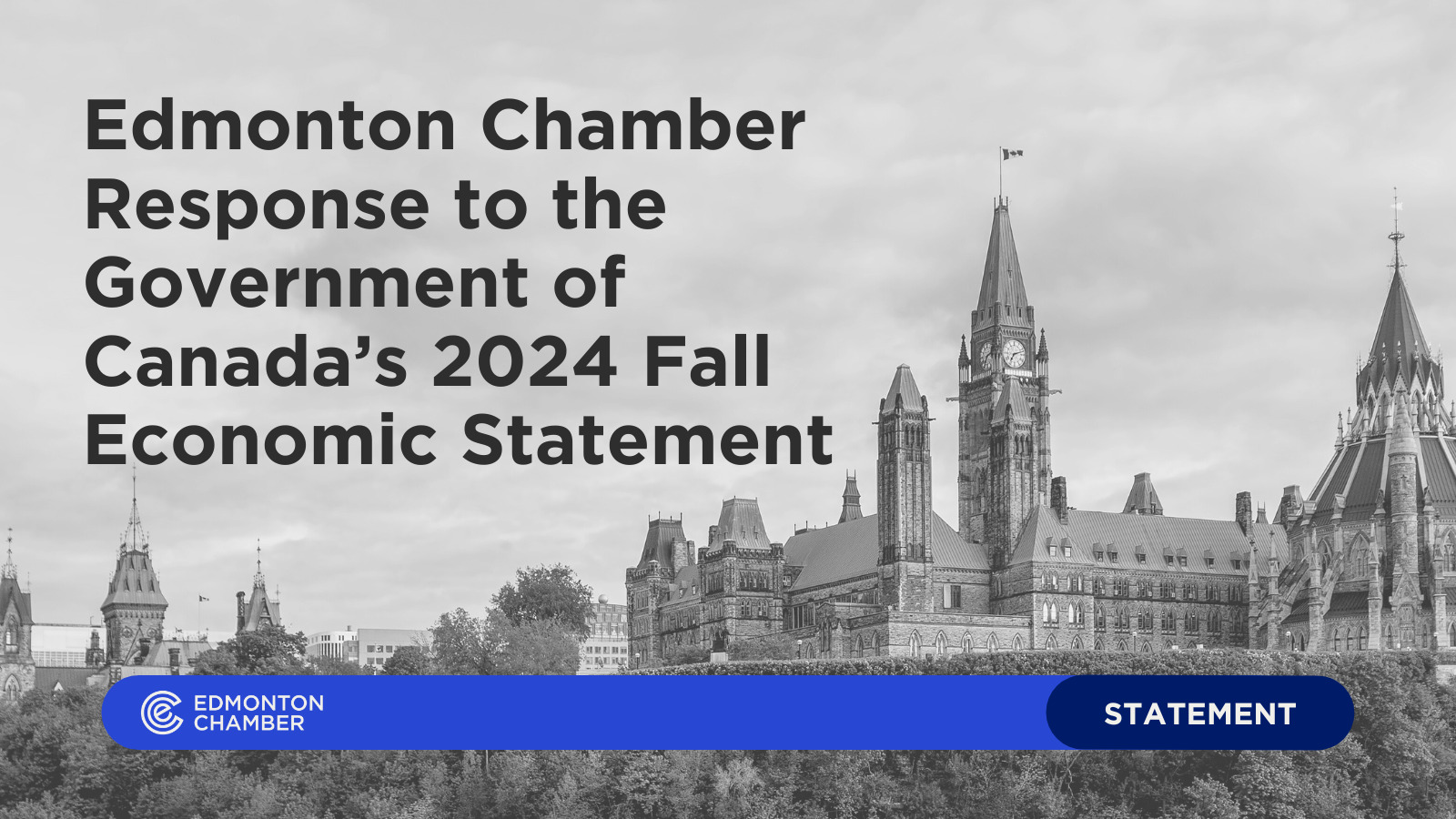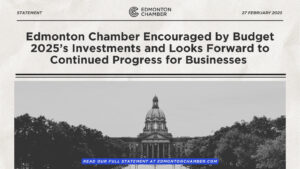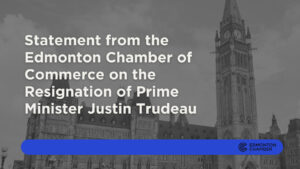December 17, 2024
Edmonton Chamber Response to the Government of Canada’s 2024 Fall Economic Statement

On December 16, 2024, the Honourable Karina Gould, Liberal House Leader and Member of Parliament for Burlington, tabled the federal government’s 2024 Fall Economic Statement in the House of Commons. The Edmonton Chamber of Commerce is deeply concerned about our country’s escalating deficit and its long-term implications for economic competitiveness, investment stability and productivity.
Earlier today, Deputy Prime Minister and Finance Minister Chrystia Freeland cited in her resignation letter from the Liberal Cabinet, that she no longer holds the full confidence of the Prime Minister. She voiced deep concerns about the economic nationalism policies anticipated from the incoming U.S. administration and emphasized the urgent need for more prudent fiscal management.
“The timing of her resignation was executed with surgical precision, sending a clear signal that Canada’s finances are heading in the wrong direction,” stated Doug Griffiths, President & CEO, Edmonton Chamber of Commerce.
The 2024 Fall Economic Statement tabled in the House of Commons reveals a troubled federal government whose out-of-touch decision-making raises serious concerns about the fiscal management, economic productivity, and long-term competitiveness of our country. Key observations from the statement include:
- Unchecked spending amid growing debt: The 2024 Fall Economic Statement presents a $61.9 billion deficit—an increase of over 50% just eight months after the release of Budget 2024: Fairness for Every Generation. Total incremental spending has increased by $14.9 billion from 2025-26 to 2028-29. Public debt charges alone will soar to $53.7 billion this fiscal year, eclipsing the $52.1 billion in federal health transfers to all provinces and squeezing room for essential investments in housing, healthcare, and social support.
- A disconnect between spending and affordability: Affordability remains the top concern for Canadians. Reforms to the Scientific Research and Experimental Development (SR&ED) program, including the extension of capital expenditure eligibility, increased credit thresholds, and expanded access to the enhanced refundable credit for public corporations, are beneficial for Canadian businesses. So too will implementation of the Digital Adoption for Small Business Financing and EV Supply Chain Investment Tax Credits. However, these measures are narrowly focused and introduced in the context of rising costs for both businesses and consumers, limiting their capacity to help Edmonton businesses invest and grow.
- Introducing further risk and uncertainty: New measures to boost growth by unlocking private and pension fund investments carry notable risks. Removing the 30 per cent cap on pension fund ownership could overexpose retiree savings, while $1 billion in venture capital funding risks distorting market dynamics. These measures, launched amid rising costs and economic uncertainty, require careful oversight to prevent unintended fiscal and economic consequences. They also overlook key issues impacting business attraction in Canada, like a complex and constantly changing regulatory environment, as evidenced by the recent Draft Oil and Gas Cap Regulations.
- The challenging fight for global capital: The government’s rhetoric around securing Canada’s position in the global competition for capital is strong but inconsistent with its actions. The introduction of new tax measures earlier this year, such as the increase to the capital gains inclusion rate, and introduction of a new global minimum effective tax rate on profits of successful multinationals, undermine Canada’s attractiveness to foreign and domestic investors alike.
Canada's economic vitality requires business-savvy leadership rooted in fiscal discipline, real productivity gains, and robust support for small and medium-sized enterprises (SMEs).
The Edmonton Chamber of Commerce calls on the federal government and recently appointed Finance Minister Dominic LeBlanc to adopt a disciplined spending approach, prioritize measures that enhance economic productivity and growth, and strengthen the country’s long-term financial outlook. While a healthy innovation ecosystem is vital, it must be complemented by policies that foster a competitive business environment and ensure fiscal sustainability.
Have your say.
The Edmonton Chamber wants to hear from you. What are the top issues and priorities for your business? Start the conversation by writing to policy@edmontonchamber.com





